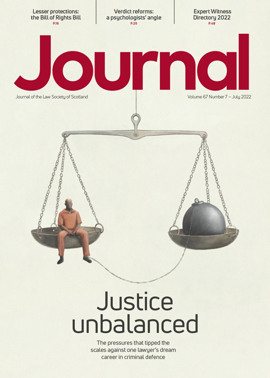TRS: time for a trusts trawl
A huge number of additional trusts will have to register with HMRC’s Trust Registration Service (TRS) before 1 September 2022. This article, which follows the article at Journal, February 2021, 42, includes a reminder of the background to TRS and explains which trusts do and do not now need to register.
Background
 The Fourth Anti-Money Laundering Directive (4AMLD) required the then EU member countries to establish a register of “beneficial owners” of structures such as trusts, companies etc. The TRS is administered by HMRC and has been in place since 2017, so it should be familiar to most trust practitioners. TRS was established to provide information and transparency on trusts to help in the fight against money laundering and terrorist financing.
The Fourth Anti-Money Laundering Directive (4AMLD) required the then EU member countries to establish a register of “beneficial owners” of structures such as trusts, companies etc. The TRS is administered by HMRC and has been in place since 2017, so it should be familiar to most trust practitioners. TRS was established to provide information and transparency on trusts to help in the fight against money laundering and terrorist financing.
In this context, the expression “beneficial owners” does not really mean “beneficial” or “owners” at all. Under TRS, “beneficial owner” is essentially the term used for any of the parties involved in a trust, even though a Scottish interpretation would not ascribe any ownership, beneficial or otherwise, to most of them. This includes a settlor, trustee, protector, beneficiary, class of beneficiaries and any other individual who has control over the trust. Where beneficiaries are identified as a class (for example, the issue of a particular person) and the class is not yet fully identifiable, it is sufficient to provide a description of the class. That changes if any individual beneficiary receives any payment or asset from the trust – their personal information must then be added.
TRS phase 1, 2017
In the first stage of TRS, only trusts which incur a UK tax liability needed to register. These are now known as registrable taxable trusts. Liability can be to any of:
- income tax;
- capital gains tax;
- inheritance tax – periodic and exit charges and/or a liability on the death of a beneficiary;
- land and buildings transaction tax (LBTT) when the trust buys property.
All existing registrable taxable trusts should already be registered unless the tax liability is a one-off (for example an IHT 10-year charge, or LBTT), in which case the trust need only be registered when the liability arises.
Any changes to the information submitted to TRS must now be reported within 90 days of the change occurring. For trusts which submit an annual self-assessment tax return, there is a box to tick to confirm that all changes have been reported or none have arisen. For other trusts, there is no need to make any annual or other declaration that no changes have occurred.
TRS phase 2, 2021
More trusts must now register
Under the Fifth Anti-Money Laundering Directive (5AMLD), all “express trusts” must now register in TRS unless they are within one of the exclusions set out in sched 3A to the revised regulations (SI 2017/692 as amended). These trusts are called registrable express trusts. Such trusts must register even if they do not have a tax liability.
Timetable
- Registrable express trusts in existence on 6 October 2020 or created before
1 June 2022, must be registered by - 1 September 2022. Non-taxable trusts created after 1 June 2022 must be registered within 90 days of being set up.
Bare trusts
Before I look at a number of these exclusions in a bit more detail, I first need to cover the situation of bare trusts. These are not always considered as being trusts at all because they are merely a structure that allows the trustees to hold property in their name on behalf of the beneficial (in its proper sense) owner of the assets.
Bare trusts are not, however, excluded from registration unless they come within one of the other exclusions. HMRC has, however, recently amended the regulations to say that bank accounts held by a parent or other individual for a child under 18 will not be required to register under TRS. This new exclusion is also being treated by HMRC (per the guidance/manual) as covering all Junior ISAs.
Exclusions – trusts on death
There are essentially three categories of trusts which arise on death and do not require to register under TRS2. As with all these exclusions, however, if the trust incurs a UK tax liability it still will need to register under the original TRS rules even though it is within one of the exemptions which apply to non-taxable trusts.
- Legislative trusts. This expression is used to apply mainly to bare trusts and life interest trusts which arise on intestacy, which will generally arise only in England.
- Will or life policy trusts within two years of death. A will trust or a trust which held only a life policy that paid out on the death does not need to register until the second anniversary after the death. If, however, the trust continues after that date, it must register even if no tax liability has arisen or is likely to arise.
- Under para 16, bereaved minor’s trusts and 18 to 25 trusts do not need to register, even if they run for more than two years after death.
Pilot trusts and co-ownership
Under para 6, pilot trusts are excluded provided the value does not exceed £100 and the trust was created before the regulations came into force on 6 October 2020. This is a very limited exclusion and if a new pilot trust, however small, is created it must register. Similarly, if additional property is added to a pre-6 October 2020 pilot trust, taking the value over £100, it must then register.
Under para 9, a trust of jointly-held property where the trustees and the beneficiaries are the same persons (described under the heading “co-ownership”) need not register. The most likely examples of such trusts are joint bank accounts (which we would not normally think of as being trusts at all), and jointly owned land and buildings in England where the property is being held in trust.
Trusts of insurance policies
The exclusion in para 7 as originally described in the TRS guidance was very limited indeed. Trusts of insurance policies that do not need to register are restricted to those paying out only on the death, critical illness or permanent disablement of the person assured or to pay care costs.
However, the guidance has now been changed to say that a trust holding a whole of life policy that could acquire a surrender value (rather than just a term policy) does not need to register. This change recognises the many problems which would have arisen for trustees and advisers because many life policy trusts tend to be forgotten about, so many clients are unlikely to know or remember that they have a trust, far less who the trustees and beneficiaries might be.
So trusts holding only conventional life policies will not need to register until the policy pays out. Trusts holding investment bonds will have to register.
Access to information
The Government recognises that the vast majority of trusts are established for legitimate reasons and, particularly because trusts are so widely used in the UK, has sought what it calls a proportionate solution to 5AMLD’s information-sharing obligations. There is no public access to the register, and access to TRS information is restricted to law enforcement agencies and third parties with a “legitimate interest” as interpreted by HMRC.
Action required now
As well as making sure that all your registrable taxable trusts have been registered on TRS and that the information on the register is complete and up to date, you will now have to trawl through your firm’s records to identify the registrable express trusts which have not so far had to register because they have not incurred a tax liability, but are not covered by the exclusions. The main such trusts are likely to be the following (although this list is not exhaustive):
- trusts holding land and buildings which do not incur a tax liability, such as those occupied by a beneficiary;
- trusts holding only insurance company investment bonds;
- trusts holding private company shares which do not normally pay a dividend;
- bare trusts other than those specifically excluded.
A key consideration is who is going to do the work, which is quite extensive and time-consuming, and who is going to pay for it, particularly where you do not currently have an engagement with the trustees, and in many cases the trust has no money available to pay fees.
Many trustees will be unaware that they are now required to register under TRS, and it is likely that some who do know that they are a trustee will decide to do nothing about it. This option is not, however, open to us as advisers, because we should know all the trusts in which we or our colleagues have been appointed as trustees and the other trusts established by our clients.
More positively perhaps, this will be an opportunity to review trusts to make sure that their trustees, beneficiaries and provisions are up to date – indeed that there are current trustees and beneficiaries.
Find out more in HMRC's TRS Manual and HMRC Trust and Estates Newsletter: August 2022
Perspectives
Features
Briefings
- Civil court: Issues on appeal
- Licensing: Minimum pricing – a genuine impact?
- Insolvency: How to admit joint creditor claims
- Tax: windfall and plastic packaging taxes raise stakes
- Immigration: Asylum system overhauled
- Scottish Solicitors' Discipline Tribunal: July 2022
- In-house: In with the stonework
- Property: Living with the Register of Overseas Entities
In practice
- OPG update: July 2022
- Public policy highlights: July 2022
- Gear up for the Scottish Legal Walks
- Disabled solicitor support group proposed
- Risk: Cybercrime – the hybrid worker prey
- Ask Ash: Piling it on
- TRS: time for a trusts trawl
- Know people, know business
- High street and hybrid
- Appreciation: Ian Leslie Shaw Balfour
- The Expert Witness Directory 2022
- Expert witness: case law update







